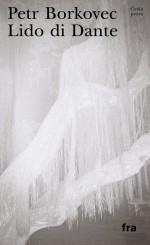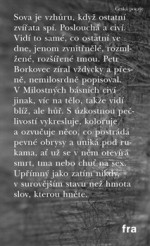Petr Borkovec (1970) is a translator and poet, recipient of many awards for his poetry including South Tyrol’s Norbert C Kaser Award and Germany’s Hubert Burda Award. His poems have been published in most European languages including English and German. At the start of the 1990s he began working for the literary review Souvislosti, he has also worked as a newspaper proofreader, the editor of newspaper literary and cultural sections and later as a publishing editor and translator from Russian. He has also translated several ancient and Korean texts into verse. From 2005 to 2023 he organised well-known author reading nights at Prague’s Café Fra.
Petr Borkovec

One Sentence
Jedna věta
| Title | Publisher | Year | Selected published translations | Awards |
|---|---|---|---|---|
| Things We Lose (Věci, které ztrácíme) | Meander | 2020 | ||
| A Herbarium for Something Worse (Herbář k čemusi horšímu) | Fra | 2018 | ||
| Lido di Dante | Fra | 2017 | DE | |
| What They Dream About (O čem sní) | Běžíliška | 2016 | ||
| The 2015 Best Czech Poems (Nejlepší české básně 2015) | Host | 2015 | ||
| The Little Thief (Zlodějíček) | Fra | 2014 | ||
| Everything is in the Garden (Všechno je to na zahradě) | Běžíliška | 2014 | ||
| Kolmý déšť | Torst | 2013 | ||
| Love Poems (Milostné básně) | fra | 2012 | DE | |
| One Sentence (Jedna věta) | Revolver Revue | 2011 | ||
| Berlin Notebooks/ Notes from Saint-Nazaire (Berlínský sešit/Zápisky ze Saint-Nazaire) | Agite/Fra | 2008 | ||
| The Interior (Vnitrozemí) | Fra | 2005 | EN | |
| Needle-book (Needle-book) | Paseka | 2003 | DE | |
| A. B. A. F. (A. B. A. F.) | Opus | 2002 | ||
| Field Work (Polní práce) | Mladá fronta | 1998 | DE | |
| The ferry (Přívoz = Überfuhr) | Edition Thanhäuser | 1996 | ||
| Between Window, Table and Bed (Mezi oknem, stolem a postelí) | Český spisovatel | 1996 | ||
| Gallery (Ochoz) | Mladá fronta | 1994 |
1995 Jiří Orten Award |
|
| Hermitage, Oracle, Puppet Theatre (Poustevna, věštírna, loutkárna) | Mladá fronta | 1991 | ||
| Silent Table Settings (Prostírání do tichého) | Pražská imaginace | 1990 |

The Little Thief
Zlodějíček

Everything is in the Garden
Všechno je to na zahradě

Kolmý déšť

One Sentence
Jedna věta

Berlin Notebooks/ Notes from Saint-Nazaire
Berlínský sešit/Zápisky ze Saint-Nazaire

The Interior
Vnitrozemí
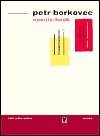
Needle-book
Needle-book

A. B. A. F.
A. B. A. F.

Field Work
Polní práce

The ferry
Přívoz = Überfuhr
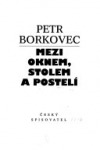
Between Window, Table and Bed
Mezi oknem, stolem a postelí
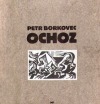
Gallery
Ochoz

Hermitage, Oracle, Puppet Theatre
Poustevna, věštírna, loutkárna
Prostírání do tichého
Petr Borkovec
Silent Table Settings
Prostírání do tichého
| Award | Year | Country |
|---|---|---|
| Jiří Orten Award | 1995 | Česká republika |
Praise
The significance of Love Poems in Borkovec’s work – especially the fragmentation of the author’s voice and his willingness to experiment – is undoubtedly a bold leap into the unknown.
—Jana Sieberová
Psí víno
He studied at the Johannes Kepler Gymnasium in Prague and then Czech language and literature at Charles University’s Faculty of Arts, though without completing his studies. At the start of the 1990s he began working for the literary review Souvislosti (Connections), he has also worked as a newspaper proofreader, the editor of newspaper literary and cultural sections and later as a publishing editor and translator from Russian. He has also translated several ancient and Korean texts into verse.
Borkovec made his debut in 1990 with Prostírání do tichého (Silent Table Settings), a collection of intimate poems which relate to Christian traditions as well as motifs from nature, which were further developed in the collection Poustevna, věštírna, loutkárna (Hermitage, Oracle, Puppet Theatre, 1991). These refer to Vladimír Holan as well as Karel Šiktanc. After this he published the collection Ochoz (Gallery), for which he was awarded the Jiří Orten Award in 1995. The critics agreed that Borkovec’s literary debut was that of a mature poet with an established system, classical features and a comprehensive grasp of language. 1996 saw the publication of Borkovec’s collection Mezi oknem, stolem a postelí (Between Window, Table and Bed). Here he presents the image of a village landscape with mist, old farmhouses and people who suffer and love. However, this collection was to divide critics into Borkovec’s supporters and detractors, who accused him of excessive distance, more “will towards poetry than poetry itself”, as the critic Josef Mlejnek wrote. Two years later the publication of Polní práce (Field Work) only served to deepen this divide. In a review of his Berlin poetry Bára Gregorová wrote that, “Borkovec is a skilful acrobat on the rope of poetic shortcuts,” which captures both his poetic virtuosity as well as his need to achieve perfection.
After a four-year interval, Borkovec’s collection A.B.A.F. was published, which contains 12 texts. “When comparing it with Polní práce, you can’t help but recognize that the occasional humour and spectacle (which had a crucial role in the previous collection), is replaced here by a certain melancholy with a related metaphorical depth,” wrote Ladislav Nagy. Needle-book, published by Paseka in 2003, is more raw and harrowing, with Borkovec partially emerging from his inner world of images.
In the middle of the first decade of the millennium the author found a permanent publisher in the form of Fra publishers, in 2005 he revised his previous poetry and added some new poems for a retrospective collection entitled Vnitrozemí (The Interior), in order to go to Berlin as an artist-in-residence. There he worked on Berlínský sešit/ Zápisky ze Saint-Nazaire (Berlin Notebooks/Notes from Saint-Nazaire, 2008). “Petr Borkovec has revealed a story to us in his book, which speaks through streets, squares and glimpsed allotments. It is a book of impressions and sightings of the people that he meets and stays with, a book of compassionate observations, a book of compassion for the things and stories that he senses from other people,” wrote Josef Straka in iLiteratura.cz. In 2014 the author completed and published the book Zlodějíček (The Little Thief).
With Milostné básně (Love Poems, 2012), Borkovec launched into painfully ironic poetry. He plays with the reader, writes in code, is ironic and slanders love, nature, the family, death and the landscape. The book’s annotation states that, “With anxious care he portrays, provides colour and gives voice to something which lacks solid form and slips through your fingers, whether within them opens up death, darkness or the desire for sex. Honest as never before, in a rawer state than the mass of words which he moulds.” Three years later Borkovec added a further ten poems to the book and Fra published it once more (again with an attractively confusing title for readers) as Wernisch.
Borkovec has also written children’s books and Běžíliška publishers brought out the collection Všechno je to na zahradě (Everything is in the Garden).
His work as a translator is also very important: he helped translate U řek babylonských (By the Babylonian Rivers, 1996) an anthology of Russian émigré poetry, and along with Jaroslav Kabíček he published translations of Vladimir Nabokov’s poetry in the book Ut pictura poesis (2002). He published an anthology of poetry by Vladislav Chodasevic called Těžká lyra (Heavy Lyre, 2004), two years later two translations of Yuri Odarchenko, Verše do alba (Verses into an Album) and Yevgeny Rein, Bylo, byli, byla, byl… (It was, they were, she was, he was…). He worked with Matyáš Havrda in translating Sophocles’s tragedy King Oedipus (1999) and Aeschylus’s trilogy The Oresteia (2002) into verse. Then in 2001 he and Vladimír Puck published an anthology of translations of classic Korean poetry, Jasná luna v prázdných horách (A Clear Moon in the Empty Mountains).


